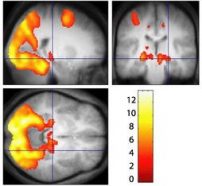Storing Memories before Bedtime
The brain begins processing lessons learned during the day long before bedtime.
A good night’s sleep may help your brain permanently file away lessons learned during the day. But, according to a new study, the brain begins processing and storing those memories long before it’s time for bed—and continues to do so even while you’re thinking about and doing other things.
 |
|
These brain-scan images reveal that certain areas of the brain (shown in color), as seen from different angles, are active while a study participant explores a virtual environment. |
| PLoS Biology |
Recent studies have shown that the parts of the brain that we use to learn a task become active again during sleep. This activity, scientists suggest, could be the brain transferring memories from short-term to long-term storage (see “Memories Are Made with Sleep”).
But the brain doesn’t necessarily wait until the lights are out to begin processing those memories.
To find out how the brain handles memories during waking hours, scientists gave 15 volunteers two tasks, each requiring different parts of the brain to learn. In one task, the subjects learned how to navigate a virtual town and then searched the town for an object. In the second task, they learned to predict where a sequence of dots would appear on a screen.
Using a special machine, the researchers scanned the volunteers’ brains right before and right after the tasks. They compared the two images to see whether the regions of the brain involved in learning the task were still active even after the task was completed.
After a break, the scientists took a third image of each participant’s brain. They wanted to determine whether these regions in the brain continued to be active after more time had passed.
They discovered that, for at least an hour after learning a task, the brain stays active. It appears to continue processing the new information.
Furthermore, the images showed that distracting the subjects doesn’t affect their ability to store memories. The processing continues even when they’re thinking about or doing other things.
Some scientists say this could mean that sleep isn’t essential for storing memories. Others disagree. Until that’s settled, it’s probably still better to be on the safe side, getting plenty of sleep.—C. Gramling
Going Deeper:
Gramling, Carolyn. 2006. Awake and learning: Memory storage begins before bedtime. Science News 169(April 1):197. Available at http://www.sciencenews.org/articles/20060401/fob5.asp .
Sohn, Emily. 2004. Sleep to remember places and routes. Science News for Kids (Nov. 10). Available at http://www.sciencenewsforkids.org/articles/20041110/Note3.asp .
______. 2003. Memories are made with sleep. Science News for Kids (Oct. 15). Available at http://www.sciencenewsforkids.org/articles/20031015/Note2.asp .







